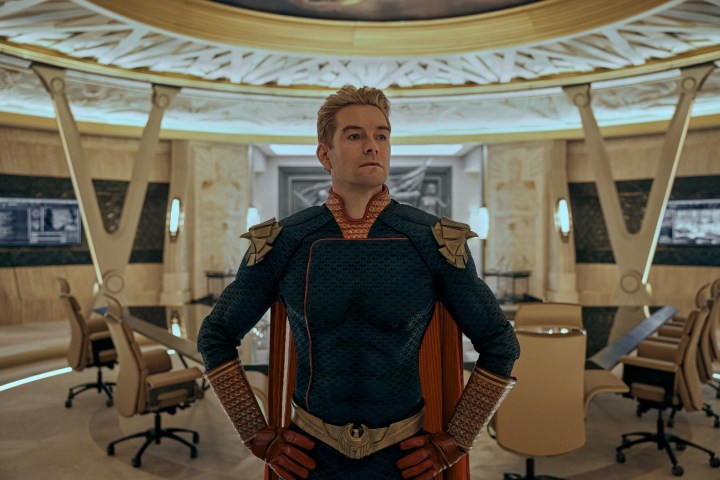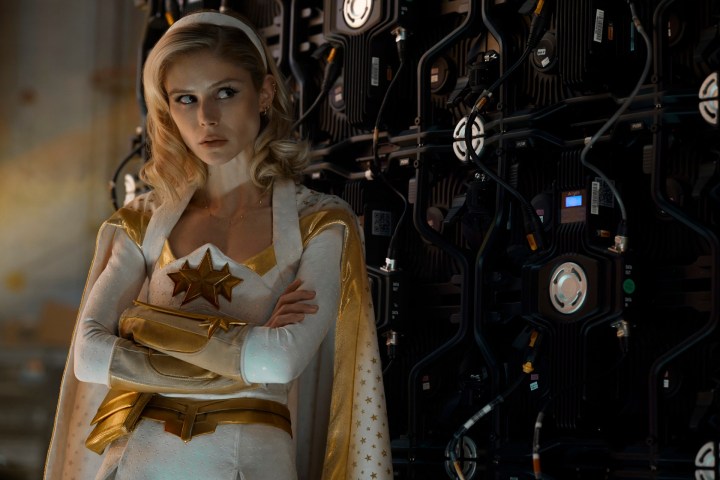The typical formula for television dramas is to raise the stakes with each season, pitting the series’ protagonists against increasingly potent threats that rise from the ashes of prior seasons’ triumphs. There’s an unspoken agreement between the show and its fans that, at some point, all of the dangers the characters have faced and the losses they’ve incurred along the way will receive some accounting at the end of their ordeal — offering a cathartic resolution to everyone involved on both sides of the screen.
In the modern TV era, shows like Game of Thrones and Breaking Bad have pushed the boundaries of how much suffering we’re willing to watch characters endure, with varying results.
Amazon Studios’ The Boys has followed a similar path, ratcheting up the sense of peril around its human and super-powered protagonists with each season, and putting them through all manner of trauma, both physical and emotional, inflicted on both themselves and their loved ones. Over the course of the series’ first two gory seasons, it softened all of that bleakness with plenty of humor and a sort of surreal quality that distanced what we see on the screen from reality.
Season 3 of The Boys dispenses with all of that, though, and delivers the darkest, most grueling, and emotionally punishing chapter of the series so far, without any indication that a cathartic conclusion is anywhere on the horizon.

Developed for TV by Eric Kripke (Supernatural) and based on the comic book series of the same name by Garth Ennis and Darick Robertson, The Boys is set in a world where superheroes are not only real, but rarely heroes. Created by a war-profiteering corporation and free to indulge in any manner of behavior as long as they don’t hurt the company’s stock price, the super-powered characters in The Boys rape, kill, maim, and steal, all under the management of a PR team that has turned them into global celebrities. The series title refers to a small, secret group of agents who attempt to police the “supes” — whether by gathering blackmail material or dishing out brutal — and occasionally, lethal — punishment for their crimes.
Over the course of the series’ first two seasons, audiences have watched mild-mannered Hughie (Jack Quaid) join the covert team led by William Butcher (Karl Urban) and engage in a high-stakes battle with Homelander (Antony Starr), the sadistic, Superman-like leader of the world’s most popular superhero team. Their war seemed to reach a grisly stalemate at the end of the show’s second season but ignites again in season 3 as Homelander becomes a Donald Trump-like figure, stoking racist nationalism in order to feed his insatiable ego and consolidate his power.

The parallels with recent events don’t end there, either, with the Black Lives Matter movement, right-wing disinformation campaigns, and even a parody of the infamous NXIVM sex cult all finding their way into the season-long story arc.
What’s conspicuously absent from the season, however, is any of the self-aware comedy that made all of the gory violence, dark themes, and cynical perspective on humanity the show offered actually, well… tolerable.
It’s difficult not to draw comparisons to HBO’s Game of Thrones, in fact, which also dragged audiences along for a journey that seemed entirely hopeless at times and seemed to revel in its own depravity. That series’ inability to deliver a satisfying conclusion is well-documented, and the third season of The Boys feels like it comes from the same playbook, opting to put shock value over substance with increasing frequency, and teasing — but never delivering — an emotional return on fans’ investment.
Basically, the villains in The Boys just keep getting worse, the heroes keep getting hurt, and the audience just keeps getting strung along.

That’s not to say there aren’t a few bright spots in season 3 of the series. After two seasons of relegation to supporting roles, Tomer Capon and Karen Fukuhara — who portray teammates Serge (aka “Frenchie”) and Kimiko Miyashiro — finally receive dedicated story arcs that not only add significant depth to their characters, but also showcase both actors’ tremendous talents. The duo are two of the series’ most fascinating characters, and instead of simply being carried along by the narrative, their story arcs in the third season propel it forward to fresh and interesting places.
As Annie January, the superhero known as Starlight, Erin Moriarty also delivers a great performance that no longer revolves around her being a punching bag for Homelander — or anyone else, for that matter. Her part in the series has always involved the nature of power and control, but the new season gives her the opportunity to take and wield it for herself instead of being an object of control for others. Moriarty gives the role a depth it’s been lacking across the first two seasons, and the show is better for it.

Sadly, those bright spots are few and far between in the overwhelmingly bleak season, which now seems more intent on testing its fans’ capacity for absorbing narrative abuse. At every opportunity to give audiences a glimmer of hope for the characters they’ve grown fond of, The Boys opts to inflict further punishment on them. When it seems like something might go their way, things only get worse. This happens so often that it becomes increasingly — and frustratingly — predictable as the season goes on, training you to expect the worst and always delivering on that promise.
That all of this unfolds amid an all-too-familiar backdrop of real-world sociopolitical touchstones makes the experience that much more depressing.
Despite all of the series’ dark themes, the first two seasons of The Boys managed to keep some amount of hope for its characters smoldering beneath all of the wreckage around them. Season 3 of the series snuffs that out, and although that bleak viewing experience might appeal to some audiences, it’s likely to leave more than a few viewers wishing the entire cast of characters would just be put out of their misery.
The first three episodes of The Boys season 3 premiere June 3, with new episodes available each Friday.
Editors' Recommendations
- Like the 1997 action satire Starship Troopers? Then watch these 3 classic sci-fi movies now
- 3 sci-fi movies on Amazon Prime Video you need to watch in February
- 3 sci-fi movies on Tubi you need to watch in January
- 3 underrated movies on Prime Video you need to watch in January
- 3 best (HBO) Max movies you need to watch on New Year’s Day






